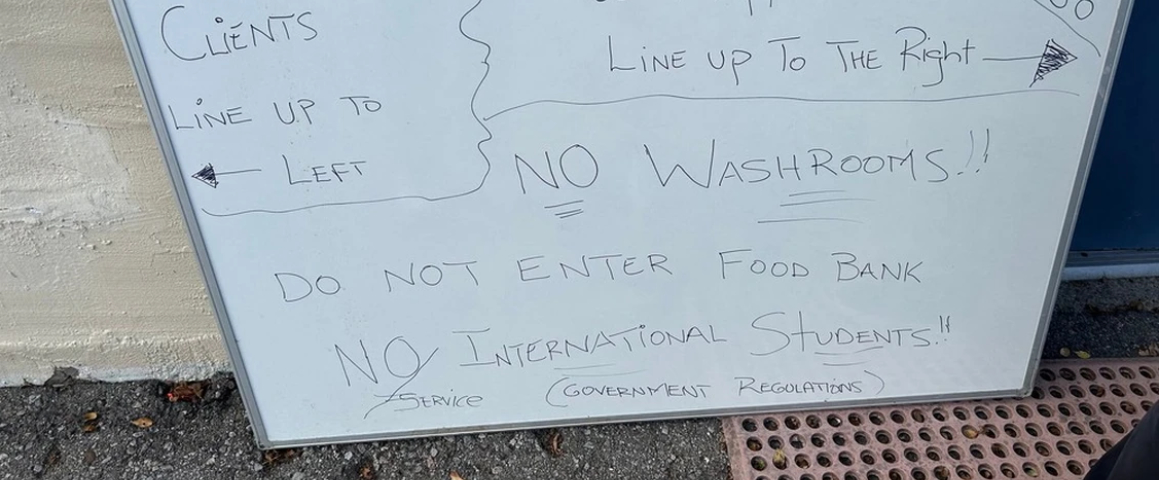By Sarah Smith
As prices for basic necessities continue to rise in Canada, narratives that blame immigration, international students and “organized retail theft” have surfaced. These false narratives expose economic conditions that are rife with contradictions.
Canada is in the midst of a cost-of-living crisis. According to a rental price report released by Rentals.ca and Urbanation, the average asking rent for a unit in Canada rose to $2178 in October 2023, representing a 9.9 percent increase over the same time last year. Meanwhile, Statistics Canada reported that grocery prices rose 5.4 percent in October 2023 and food banks are reporting that twice as many people in Toronto are accessing their services compared to a year ago.
Throughout the past year, articles have been circulating that link higher housing costs to rising immigration rates and recently, there have been reports of some food banks explicitly barring international students, who are viewed as an unwelcome burden on an already strained system. The explanation being presented is that if demand outpaces supply, then prices invariably rise and when resources become scarce, the most recent arrivals are to blame. These narratives seem to be catching on – results from a Leger poll conducted in November 2023 indicated that 75 percent of people in Canada think that immigration is fueling the housing crisis.
Yet, the same Leger report also revealed that 63 percent of the same respondents believe that young immigrants contribute to the workforce and tax base, which helps support older people in Canada. Likewise, an increased reliance on international post-secondary students, who pay as much as five times the domestic tuition rates, is driven by the need to fill the gap left by decreasing levels of government funding. Under this contradictory logic, immigration and international students are, at once, burdening and bolstering the economy.
The reality is that housing prices are neither proportionally nor directly linked to immigration rates at a macro-level. Singling out immigration and international students only distracts from solutions that could make a difference, such as a massive public investment in affordable housing, an expanded rent control system and measures to curb real estate speculation.
This fall, Crime Stoppers launched an “Organized Retail Crime Awareness Campaign” called “It Costs Us All,” where Toronto Police Chief Myron Demkiw stated, “(t)hese crimes are costing all of us because they drive up the prices of products that we purchase on a regular basis.” This campaign also included a petition to change the Criminal Code to “bring stiffer penalties” to all those involved, as well as an anonymous tip-line to report instances of “Organized Retail Crime.” At the same time, this holiday season features an increase in uniformed off-duty police officers working as hired security guards at retail stores and new security gate installations at many grocery stores and pharmacies. Their implication is simple – rising prices are a result of retail theft.
Strikingly, during the Crime Stoppers press conference the police highlighted baby formula as a popular product for these “organized” thefts. The focus on retail theft obscures the reality that a rising cost-of-living combined with stagnant real wages creates a market for cut-rate products, not vice versa. As inflation continues to outpace wage increases, the contradictions of an economy that at once needs high-wage consumers and low-wage workers in order to operate comes into sharp relief.
The spotlight on organized retail theft as a driver of rising prices sidesteps the expanding gap between the cost-of-living and stagnant wages, while blaming immigration for rising housing costs distracts from the lack of both public investments and regulatory protections. For these reasons, it is essential to combat narratives that scapegoat specific groups and to demand a shift in focus towards meaningful solutions for everyone.
Support socialist media!
If you found this article useful, please consider donating to People’s Voice or purchasing a subscription so that you get every issue of Canada’s leading socialist publication delivered to your door or inbox!
For over 100 years, we have been 100% reader-supported, with no corporate or government funding.




